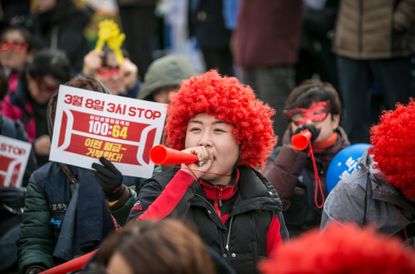Molka: South Korea’s voyeurism problem
Authorities arrest two men over secret spycam filming of 1,600 guests in hotel rooms

Authorities in South Korea have arrested two men and are investigating a further two over a spycam website that live-streamed footage of hundreds of hotel guests without their knowledge.
The men hid 1mm lens cameras in items including hairdryer holders and wall sockets in 42 rooms at 30 hotels in ten cities across the country, reports CNN. A total of about 800 videos of couples having sex were then streamed online for customers who paid a monthly fee to watch, over a period of about five months, according to a report on the South China Morning Post site.
The arrests follow recent allegations that K-Pop sensation Seungri was a member of a chat group that shared sex videos secretly recorded by singer Jung Joon-young without the consent of the women involved.
Subscribe to The Week
Escape your echo chamber. Get the facts behind the news, plus analysis from multiple perspectives.

Sign up for The Week's Free Newsletters
From our morning news briefing to a weekly Good News Newsletter, get the best of The Week delivered directly to your inbox.
From our morning news briefing to a weekly Good News Newsletter, get the best of The Week delivered directly to your inbox.
The incidents are part of a widespread problem “known as ‘molka’ - which is the secret filming of women in public places such as toilets and changing rooms, but sometimes even in their own homes”, says The Verge.
Last summer, tens of thousands of women protested on the streets of Seoul over the growing trend, which saw 6,470 cases reported in 2017 alone, up from 1,353 in 2012. The outcry began “after a woman was arrested for secretly photographing a male colleague as he modelled nude for university art students”, says the BBC.
Female protestors claimed police immediately detained the woman because the victim was male, whereas incidents involving female victims rarely result in prosecution.
“A deep-seated sexism lies behind the incredibly unbalanced numbers between men and women regarding this crime,” one of the protest organisers, who did not wish to be named, told The Guardian. “The problem is aggravated by the uncooperative attitude of the police and the light penalties given out by the courts.”
The country’s president, Moon Jae-in, said last year that illegal spycam images had become “a part of daily life” and called for tougher penalties for perpetrators.
Offenders face a fine of up to 10m won (£6,800) or a maximum prison sentence of up to five years, but campaigners say few feel the full force of the law. Many offenders “are ordered to pay modest fines and in most cases the crime goes unpunished”, says The Guardian.
Indeed, according to official government figures, of 5,437 people arrested over the reported spy camera offences in 2017, only around 2% were charged.
South Korean police have denied claims that they fail to take women’s complaints seriously, saying that verifying allegations based on footage that often does not show the victims’ faces was very difficult.
Create an account with the same email registered to your subscription to unlock access.
Sign up for Today's Best Articles in your inbox
A free daily email with the biggest news stories of the day – and the best features from TheWeek.com
-
 Magazine interactive crossword - May 3, 2024
Magazine interactive crossword - May 3, 2024Puzzles and Quizzes Issue - May 3, 2024
By The Week US Published
-
 Magazine solutions - May 3, 2024
Magazine solutions - May 3, 2024Puzzles and Quizzes Issue - May 3, 2024
By The Week US Published
-
 Magazine printables - May 3, 2024
Magazine printables - May 3, 2024Puzzles and Quizzes Issue - May 3, 2024
By The Week US Published
-
 Sydney mall attacker may have targeted women
Sydney mall attacker may have targeted womenSpeed Read Police commissioner says gender of victims is 'area of interest' to investigators
By Julia O'Driscoll, The Week UK Published
-
 Why are kidnappings in Nigeria on the rise again?
Why are kidnappings in Nigeria on the rise again?Today's Big Question Hundreds of children and displaced people are missing as kidnap-for-ransom 'bandits' return
By Julia O'Driscoll, The Week UK Published
-
 Deaths of Jesse Baird and Luke Davies hang over Sydney's Mardi Gras
Deaths of Jesse Baird and Luke Davies hang over Sydney's Mardi GrasThe Explainer Police officer, the former partner of TV presenter victim, charged with two counts of murder after turning himself in
By Austin Chen, The Week UK Published
-
 How the idyllic Galapagos Islands became staging post in world drug trade
How the idyllic Galapagos Islands became staging post in world drug tradeUnder the radar Ecuador's crackdown on gang violence forces drug traffickers into Pacific routes to meet cocaine demand
By Harriet Marsden, The Week UK Published
-
 Armed gangs, prison breaks and on-air hostages: how Ecuador was plunged into crisis
Armed gangs, prison breaks and on-air hostages: how Ecuador was plunged into crisisThe Explainer Gangs launch deadly revenge after president declares state of emergency following escape of feared drug boss from prison
By Harriet Marsden, The Week UK Published
-
 Ecuador tips toward chaos amid prison breaks, armed TV takeover
Ecuador tips toward chaos amid prison breaks, armed TV takeoverSpeed Read New President Daniel Noboa authorized the military to 'neutralize' powerful drug-linked gangs after they unleashed violence and terror across Ecuador
By Peter Weber, The Week US Published
-
 Prague shooting: student kills 14 people at university
Prague shooting: student kills 14 people at universitySpeed reads Police believe suspect, who killed himself, may have shot his father before carrying out mass murder
By Arion McNicoll, The Week UK Published
-
 Ex-US diplomat confessed spying for Cuba to undercover agent, FBI says
Ex-US diplomat confessed spying for Cuba to undercover agent, FBI saysSpeed Read DOJ says former US ambassador Manuel Rocha perpetrated 'one of the highest-reaching and longest-lasting infiltrations of the United States government by a foreign agent'
By Peter Weber, The Week US Published